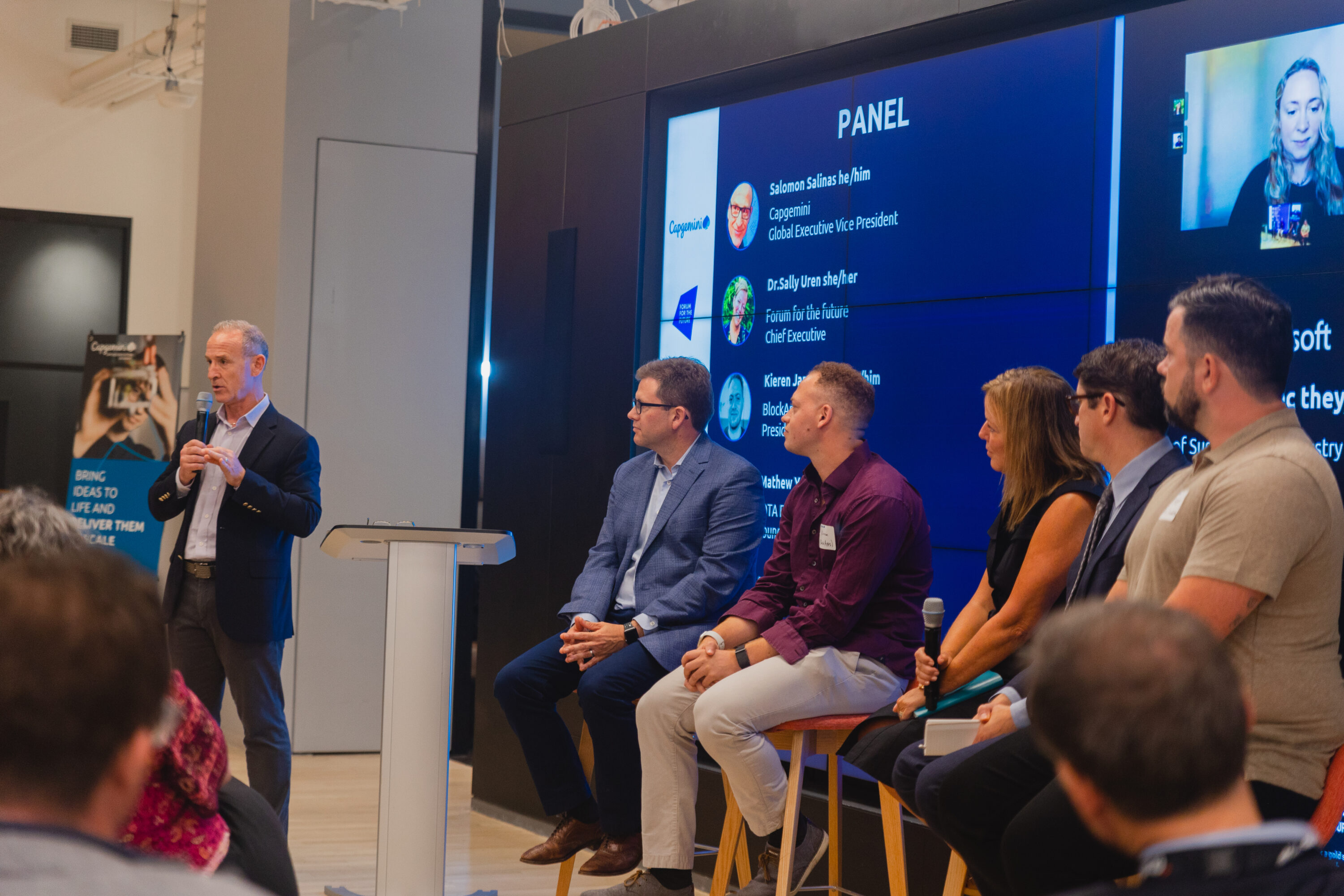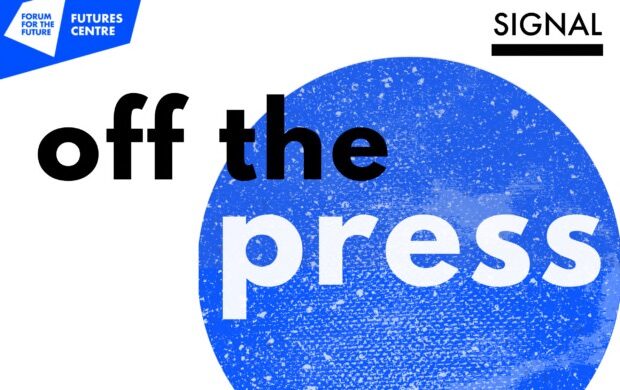Political leaders and businesses are being forced to look up and respond to the growing climate crisis. But will the current economic models and policies be delivered at the speed and scale needed, or will net zero remain the bare minimum with us still relying on natural ecosystems to radically reduce carbon dioxide? As part of our Beyond Greenhouses Gases project with Capgemini, we explore the role of proactive methodologies for deep and urgent greenhouse gas (GHG) reductions. Matthew Bradley, Capgemini’s Group Environmental Sustainability Lead joins us to examine the growing focus on business to move from net to absolute reductions and adopting a systemic lens that accounts for social and environmental impacts in this journey to decarbonise.
“We are at a crossroads. The decisions we make now can secure a liveable future. We have the tools and know-how required to limit warming,”
IPCC Chair Hoesung Lee
Against the backdrop of what has been termed the “Summer of Climate Disasters”, transformative market instruments, technologies and methodologies need to be scaled and applied across the globe to ensure we deliver deep emission reductions. Deep cuts that call for substantial, well-thought, and long-lasting reduction in absolute emissions across business, governments and society at large.
Johan Rockstrom within his piece for Forum’s Future of Sustainability 2021 debated that “The question is not whether we’ll be able to decarbonise the world economy, and come back within a safe operating space. The question is only will we do it in time? Will we be too late?”
Political leaders and businesses are being forced to look up and respond to the crisis. But will the current economic models and policies be delivered at the speed and scale needed, or will net zero remain the bare minimum with us still relying on natural ecosystems to radically reduce carbon dioxide? Today, we have no shortage of observations, analytics, modelling data or even real-life data that captures the ongoing effects of climate-induced impacts. Yet the mindsets continue to focus on short-term horizons and profits taking precedence.
Capgemini’s impact measurement methodology, shared within our recent joint report with Forum for the Future, Measuring Impact: a methodology to inform transformative project design allows for organisations to be proactive and account for unintended consequences early in the process but we know there’s a need for businesses to adopt a systemic lens and go beyond the data. Businesses need to rapidly shift mindsets and look beyond the realm of their operations and supply chain to realise the critical role they play in determining the planet’s future.
Can organisations take advantage of this current window of opportunity to move from net to absolute reductions, and have a positive ripple effect on other social and environmental systems?

Bridging towards a systemic and long-term approach to impact measurement
“The purpose of a business is to help us as individuals, societies and the natural world to solve problems, and to do so in a way that is commercially viable for business and yields profits for business. There is a second very important part of the notion of purpose: that it is not to produce or to profit from producing problems for people or the planet.”
Professor of Management Studies at the University of Oxford, Colin Mayer
Business in general cannot be considered in isolation and requires a deeper examination of the nodes closely connected with it. A transition from fossil fuels to clean energy critically impacts a region’s livelihoods, landscapes, and human health. Digging even deeper, it inspires a shift within society from more transformative policy, a more resilient economic system and better planetary health. This sounds easier said than done as moving beyond business as usual to more regenerative models would depend not on one individual policy or technology or methodology, but a sense of interconnectedness amongst those.
The effectiveness of these innovation-induced transitions would also depend on the location and how deeply embedded the mindsets are in implementing these.
Greenhouse gases (GHG) impact calculation or reduction is not the silver bullet but it offers an entry point to bridging tech-based solutions to address GHG emissions through a lens of addressing issues of biodiversity loss, equity, adaptation, food security, and more. Having a systemic view could open pathways that are far less expensive when compared to the true cost of carbon (the damage to planetary health and human health such as rising temperatures, and increased flooding).
Adopting a methodology, such as the GHG impact measurement methodology, or carbon-reducing technologies, also needs a cognitive shift from “fixes” that seem inexpensive and beneficial, to solutions that could lower costs over a longer time period. Businesses, and particularly the investor community, would need to grapple with ideas of short-term versus long-term profits and critically examine the stakeholders impacted by their work. There needs to be simultaneous change across social, technical, economic, and political parameters to support the large-scale transformation in the time we have. Organisations, businesses, and innovative project design offer an area of untapped potential where not only can adopting rigorous measurement create deep reductions through their supply chain, but they can also spillover through their power and resources to deepen wider action and help mitigate impacts at a global scale.
Activators within this approach
The industrial revolution saw the rapid increase of GHG emissions into the atmosphere, and also the introduction of modern financial auditing. According to ClimateAction100, 69% of focus companies have now committed to achieving net zero emissions by 2050 or sooner across all or some of their emissions footprint. While most organisations have a handle on their Scope 1 and 2 GHG emissions (from sources within their control), not many have a handle on Scope 3 emissions which can often be among the largest emissions, and also complex to report on at times. Scope 3 can be challenging to track across complex global supply chains or the work they do with their partners. It’s time for us to adopt a mechanism akin to financial auditing which ensures fair and accurate representation of an organisation’s carbon emissions transactions in the same way we do for financial transactions. We may not have the luxury of time to evolve and finesse our practices when it comes to carbon emissions auditing but it is imperative that we undertake a consistent and rigorous approach to audit and verify emissions across all scopes.
The Science Based Targets Initiative is a valuable resource that lays clear pathways for businesses to understand how to “future-proof” their growth while preventing the worst impacts of climate change. Targets are considered ‘science-based’ if they are in line with what the latest climate science deems necessary to meet the goals of the Paris Agreement – limiting global warming to 1.5°C above pre-industrial levels. Capgemini’s GHG Impact Methodology builds on this science-based approach and begins to unpack a pathway for business to track those complex emissions across service-based industries.
Innovation within business has remained synonymous with driving efficiency, optimisation, and digitising but we have witnessed a radical shift towards digital transformation, and as a result business transformation is looking to align more with larger societal purposes. This methodology sits amongst a vast ecosystem of startups and technologies that work on global GHG emission reduction technology and climate positive solutions. From satellite imagery, AI to remote sensing, companies have embraced technology and data to address issues across their supply chain and identify interventions in the larger system they operate in. Google’s real time land data provides landowners/industries access to information that couples not only science-based land health but also societies’ relationship with land allowing for more integrated and collaborative approaches.

There is also a higher degree of scrutiny emerging on business to deliver on claims to net zero, carbon neutrality, and climate positive. Often these terms are also used interchangeably by companies and pose a challenge for transformative corporate leadership on climate. Unpacking what it means to truly reach these targets also challenges companies to raise the bar and create impact through not only their work but also those that they are partnered with. The Science Museum in London similarly requires their sponsors and partners to achieve a Level 4 on the Transition Pathway Initiative Management Quality to ensure alignment with the Paris 1.5°C degree pathway. Given the limited global carbon budget, such policies and methodologies by companies need to be designed and enforced ambitiously critically accounting for hidden consequences to ensure this urgent journey to decarbonise.
Value of using this methodology for system change:
Capgemini’s sustainability team has been undertaking research and engaging with stakeholders to help set a universal standard. It has become evident that whilst there are elements of methodologies, there are none that can directly support the transparent calculation and reporting of carbon impacts via technology or consulting projects.
The methodology has been purposely designed to be industry agnostic and has been used in aviation and tech, to name a few industries. Whilst in its early phases, it is limited to understanding carbon emissions impacts, it has the ability to be incorporated throughout the lifecycle of a project. Many organisations have their sights set on either carbon neutrality or net zero. However, it is imperative that the greenhouse gas emissions impacts of any project undertaken are understood at the design phases to understand how it may either contribute to or hinder the achievement of the overarching goals.
This methodology helps one be more proactive in estimating and reducing emissions at the early stages of design, instead of realising the impact only at the end and not being prepared enough to make substantial changes. Such targets and practices, albeit daunting, can be built and achieved with the right level of ambition, and there are numerous organisations to help businesses through this. As discussed, no entity is disconnected from the others. Every entity is connected to the rest of its system and to other systems. Businesses form an integral part of that system. They are directly connected to people, the government, natural resources, ecology, built infrastructure, technology, which means they directly (or indirectly) impact systems they’re linked to, and get impacted in return. While this is a responsibility, it means that bringing together players in this system can help us achieve the targets we need to, and build a regenerative world.

You can now watch the conversation here
So What?
The buck doesn’t stop at measurement nor does it stop at carbon offsets. One has to reimagine business – envisioning regenerative businesses, which address the nexus of business and climate with both its environmental and social aspects too. As Forum’s Business Transformation Compass highlights, it’s time for businesses to transform from “doing less harm” to “doing good”. It is possible and it all starts with a vision.
James Vincent, the founder of Foundation for Neglected Disease Research (FNDR), has said “humans weren’t made to sustain, but to evolve.” In the context of just and regenerative businesses, how can we evolve beyond sustainability? This is a question that poses as challenging, exciting, potential for great innovation, creativity, and execution, and to reflect and address it is the need of the hour.
What’s next?
- Can business rise up to the wicked challenges of today? Can we unlock transformative decision-making before it’s too late? What will it take for business to grab this window of opportunity for deep transformation through the lens of GHG reductions?
Launching this month, this special edition of the Futuring Podcast features Sol Salinas Executive VP – Sustainability Lead for the Americas (Capgemini) as he chats with innovators, business leaders and sustainability experts to explore the trajectory beyond Net Zero and examine the potential of impact measurement to raise business’ ambition and build a future where people and planet thrive.
Join us
- Explore how businesses can adopt this methodology and go beyond calculating current emissions to inspire transformative design and decision making within our new report, Measuring impact: a methodology to inform transformative project design
- Capgemini and Forum for the Future hosted “The Path to Net Positive: Next Generation Supply Chain Management” at ClimateWeek NYC 2022. You can now watch the conversation here.
- Join us on this exploration of how GHG reductions can play a transformative role towards a just and regenerative future and follow the Beyond greenhouse gases project
- Share your thoughts with us on Twitter using #BeyondGHG
- If you would like to find out more, then get in touch with us at futurescentre@forumforthefuture.org
Recommended Reads
- Irreversible tipping points, winning narratives and whether transformation will be too late: Reflections from Johan Rockstrom
- Catalysing GHG reductions through transformative project design
- Future of Business is Regenerative
- How to Build a Regenerative Business — and Save the Planet
About Beyond greenhouse gases: Transforming project design through impact measurement
Co-produced by international sustainability non-profit, Forum for the Future and global information technology company, Capgemini, Beyond greenhouse gases: Transforming project design through impact measurement will explore how businesses can unlock more transformative project design and decision making, through the lens of greenhouse gas (GHG) reduction. Over the next four months, we will be publishing a series of insights and podcasts featuring industry leaders spanning sustainability, technology, and business. We will be exploring: the world of GHG accounting, climate change impacts, the importance of ‘futures’ thinking and how we must adapt our approaches and the way we work.
With thanks to our partner
Beyond greenhouse gases was made possible thanks to the generous support from our partner: Capgemini













Join discussion